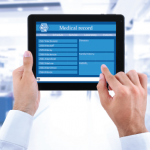The current health system places increasing pressure on physicians and their practices to find new and innovative ways to maximize reimbursement through the implementation of programs and workflows that ensure the delivery of higher quality care—all while the ever-increasing needs of the patient population are placing a greater demand on physician time.
Although these pressures can be frustrating, clinical decision support (CDS) tools can greatly streamline care delivery while providing prompts for the execution of evidence-based care.
Understanding CDS
Most think of CDS strictly as a system of pop-up reminders and directives that often serve little clinical value. In reality, this is only one of many forms of CDS. Clinical decision support is defined as an intervention providing clinicians or patients with clinical knowledge and patient-related information intelligently filtered or presented at appropriate times, to enhance patient care. In its most basic definition, CDS is simply a method of delivering the things you learned from books and journals, reformatted and delivered when and how you need them in practice. In effect, CDS helps you to know the right thing at the right time and then helps you to do it.
The best CDS does not intrude into normal events—unless a dangerous or unusual situation has developed—and should seamlessly support the usual flow of care, making the process easier.
Why Should I Use CDS?
Incorporating effective CDS into your practice can help you to cope with many of the pressures of today’s healthcare environment, including:
- Payment: CDS can provide tools to help you understand, improve, and report guideline targets for payer-driven incentive programs.
- Quality: Some CDS systems support the delivery of patient-specific and clinically relevant information when, where, and how you need it.
- Safety: More traditional CDS tools that actively distribute content for alerts, care plans, smart forms, and risk assessments can play a fundamental role in helping the whole care delivery team adhere to best practices for the delivery of safe care.
- Training: CDS modules can provide prompts and training tools for the entire care team, ensuring that your practice stays current on best practices and the latest in evidence-based medicine.
How Do I Incorporate CDS Into My Practice?
CDS comes in many different forms and ideally should be delivered in a way that is most effective for its purpose. CDS interventions are typically designed to specifically support care delivery goals associated with the prevention of errors (of omission and commission), to optimize decision making, and to improve the execution of processes of care. It is very likely that your practice deploys CDS tools that are already active and encouraging good practice today. Below are some examples of what CDS looks like in practice.


